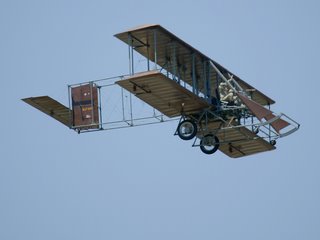


|

|
|
|
Home |
The Mil & Aero Blog
Signal processing expert: the day when imagination, not technology, is our chief limitationTuesday, January 8, 2008  Posted by John Keller I had a fascinating conversation with a signal-processing expert at Analog Devices yesterday. It seems we may be reaching the stage where innovation is not limited by technology any longer, but by the vision of the folks designing the systems. For so long, systems designers have had to work within the constraints of whatever is the state of the art in technology, and nearly always fall short of what they might actually want to achieve. That's not so much true anymore, says Dr. Mike Coln, division fellow of precision converters at the Analog Devices Inc. signal processing group in Wilmington, Mass. "What is possible on silicon these days is fairly impressive," Coln says. "There are many cases where the limitations in the sorts of products you can build, and the opportunities you can serve, are not so much in silicon, but constrained by the vision of the people designing those products." That sounds like we've reached the stage where if you can dream it up, you can build it, with not too many technological hurdles getting in your way. One thinks back to the Wright Brothers, who for all their lives undoubtedly gazed at birds and flying insects, and struggled mightily to develop rudimentary technology necessary to emulate them. They came up with wood, wire, fabric, and a noisy engine. It was barely just good enough. Now advanced aircraft developers can build robotic insects and birds. It is truly amazing, at the expense of sounding gushy, how far technology has advanced in the hundred-odd years since then. More to the point, it's amazing the technological advantages that today's systems designers have -- how spoiled they really are. If you can imagine it, you can build it -- no matter how complex. If only Wilbur and Orville knew. But the story doesn't stop here. In fact, it's the beginning of a whole new volume that begins something like this: if technology is no longer the biggest challenge to innovation, then the very imaginations of the systems designers become our biggest limitation. "Now it is people issues, as opposed to engineering issues," Coln says. How to break through these new limitations? "We need better partnerships between people like me and the people in the systems-integration community," Coln says. "That's my call to arms. By partnering with their suppliers, the integrators discover the overlap between what is possible and what is worthwhile. They are not aware of what we are truly capable of doing, and we are not aware of the challenges they face." Perhaps as we move forward into the 21st century, these imagination limitations, as opposed to technological limitations, will give rise to new business practices and systems-development models that could redefine what we know as inter-company competition. I'm not sure exactly how something like that might come about, but the results could be worthwhile. All we have to do is imagine it. 0 Comments:
<< Home |
Welcome to the lighter side of Military & Aerospace Electronics. This is where our staff recount tales of the strange, the weird, and the otherwise offbeat. We could put news here, but we have the rest of our Website for that. Enjoy our scribblings, and feel free to add your own opinions. You might also get to know us in the process. Proceed at your own risk. 
John Keller is editor-in-chief of Military & Aerospace Electronics magazine, which provides extensive coverage and analysis of enabling electronic and optoelectronic technologies in military, space, and commercial aviation applications. A member of the Military & Aerospace Electronics staff since the magazine's founding in 1989, Mr. Keller took over as chief editor in 1995.  Courtney E. Howard is senior editor of Military & Aerospace Electronics magazine. She is responsible for writing news stories and feature articles for the print publication, as well as composing daily news for the magazine's Website and assembling the weekly electronic newsletter. Her features have appeared in such high-tech trade publications as Military & Aerospace Electronics, Computer Graphics World, Electronic Publishing, Small Times, and The Audio Amateur.
Courtney E. Howard is senior editor of Military & Aerospace Electronics magazine. She is responsible for writing news stories and feature articles for the print publication, as well as composing daily news for the magazine's Website and assembling the weekly electronic newsletter. Her features have appeared in such high-tech trade publications as Military & Aerospace Electronics, Computer Graphics World, Electronic Publishing, Small Times, and The Audio Amateur.
 John McHale is executive editor of Military & Aerospace Electronics magazine, where he has been covering the defense Industry for more than dozen years. During that time he also led PennWell's launches of magazines and shows on homeland security and a defense publication and website in Europe. Mr. McHale has served as chairman of the Military & Aerospace Electronics Forum and its Advisory Council since 2004. He lives in Boston with his golf clubs.
John McHale is executive editor of Military & Aerospace Electronics magazine, where he has been covering the defense Industry for more than dozen years. During that time he also led PennWell's launches of magazines and shows on homeland security and a defense publication and website in Europe. Mr. McHale has served as chairman of the Military & Aerospace Electronics Forum and its Advisory Council since 2004. He lives in Boston with his golf clubs.
Previous Posts
Archives
|
|||||
Internet gems
THE MAE WEBSITE AUTHORS ARE SOLELY RESPONSIBLE FOR THE CONTENT AND ACCURACY OF THEIR BLOGS, INCLUDING ANY OPINIONS THEY EXPRESS, AND PENNWELL IS NOT RESPONSIBLE FOR AND HEREBY DISCLAIMS ANY AND ALL LIABILITY FOR THE CONTENT, ITS ACCURACY, AND OPINIONS THAT MAY BE CONTAINED HEREIN. THE CONTENT ON THE MAE WEBSITE MAY BE DATED AND PENNWELL IS UNDER NO OBLIGATION TO PROVIDE UPDATES TO THE INFORMATION INCLUDED HEREIN.
|
||||||
|
|
Home | About Us | Contact Us | Corporate Website | Privacy Policy | Courage and Valor Foundation | Site Map
Also Visit: Laser Focus World | Vision Systems Design | Industrial Laser Solutions Copyright © 2007: PennWell Corporation, Tulsa, OK; All Rights Reserved. | Terms & Conditions | Webmaster |